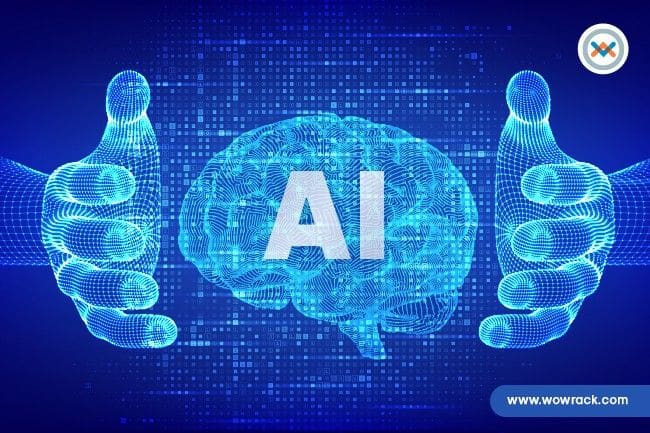In our previous blogpost, we have discussed what Artificial Intelligence is, what are its components and types, and how does it work. In this blogpost, we are going to dive deeper into how businesses can utilize AI, the concerns surrounding them, and what the future holds for it.
Use Cases of AI
Content Creation
ChatGPT, the second fastest app to reach 100 million users, is an AI-powered tool that has been widely used by people from various industries over the past 10 months. It helps copywriters and content creators to generate relevant content ideas, outlines, and even scripts, saving them lots of time. Aside from ChatGPT, writers also can use AI-based software that helps them with checking their grammar, like Grammarly.
Businesses also benefit from AI as software like Canva and Dall-E can help them in creating graphics and slide designs. Another software that is also popular for content creation is Lumen5. It helps businesses in creating video content for marketing purposes, without having to be an expert at videography.
Cybersecurity Measures
AI-powered software can also help monitor your IT systems, identify cyber threats, and respond to attacks in real-time to prevent your systems from getting infected. SentinelOne is one example of this. It uses AI to help their clients in the incident response process. This helps in saving time and with SentinelOne, users can sleep well at night knowing that SentinelOne will take care of whatever problem that may happen to their devices.
Business Process Automations
Some administrative tasks can be repetitive and take a lot of your employees' time. An example of this would be transferring a customer's data or information from calls or emails to your record.
The good news is, AI can now save you from that. It can recognize words from those calls and e-mails and convert them to text. It can also use NLP techniques to extract dates, names, and even order numbers from e-mails. With this, your employee can now focus on resolving customer's issues, engaging with them, and checking if the extracted information is accurate.
Data Analysis
AI can help you analyze lots of data and identify the patterns within them quickly. While it is true that we can do this on our own, we usually take more time, and we might also overlook some details. AI on the other hand, can analyze more accurately.
With the help of AI, our staff can focus on checking and validating the analysis that it has provided. This way, companies can generate more accurate analysis and forecasts that eventually can help with resource allocation and strategic decision-making.
Tailored Marketing
Through data analysis, AI can help so that your ads are shown to your target market. Additionally, it can also help you in sending personalized emails to your potential or current customers. It can also help analyze your current and predict your future customer behavior. Analyzing this stuff can sometimes take a lot of time if you do it on your own. With Artificial Intelligence, you can save a lot of time and focus on developing your products instead.
Concerns Regarding AI
Unemployment
One of the most common fears that arises with the growth of AI is job loss. AI-powered software now can create graphics, write articles, and handle coding faster than humans do. Due to this, people are worried that they may be replaced by AI. This also applies especially for jobs that require a routine task, like data entry or customer service, as AI makes it possible for companies to automate these tasks.
Although AI may create new job opportunities, it may take some time for workers to acquire these new skills. This eventually also leads to temporary unemployment. Adapting to the AI-driven job market may also require a lot of training and resources, which not everyone has access to.
Security
People are also worried about the possibility of AI being used for malicious purposes. This includes if it were to collect our personal data without our consent, AI-powered cyber-attacks, and the misuse of AI software to scam others.
An example of AI-powered technology that raises a lot of ethical concerns is Deepfake. With Deepfake apps, you can record videos of people doing things they never actually did. It uses Artificial Intelligence algorithms to manipulate people’s faces and voices. With the rise of Deepfake apps, people are starting to worry about how this software can be used to spread fake news and scam others.
Bias
Another concern that circulates around the usage of AI is regarding bias and fairness, as AI software usually makes decisions and draws conclusions only based on the data that it has been supplied with. Thus, if the data it has is biased and limited, the AI is likely to make biased conclusions and recommendations.
Imagine if these biased conclusions were to be used by the human resources department in the application screening process. There’s a chance that the screening process was biased, and people might get eliminated unfairly.
What the Future Holds for AI
Human-AI collaboration
In the future, we can look forward to more collaboration between humans and AI. This is also because humans still possess certain skills and traits that Artificial Intelligence doesn’t have, such as empathy, creativity, and complex problem-solving skills.
Thus, rather than replacing humans, many experts think that we should see AI as a tool that can help humans in increasing their productivity. It can help humans by doing the more routine tasks such as data processing and analysis, while humans can focus on the more complex tasks that require critical thinking, such as building relationships with customers. AI can also help generate ideas or solutions, while humans can use their creativity and critical thinking skills to evaluate and modify these ideas to fit their needs.
Regulation for AI
With the growth of AI, the government and policymakers will definitely develop and issue regulations for its usage. This is to ensure that it is being used ethically and not for malicious purposes. These regulations include how AI systems should use its data, safety standards and assessment for AI technologies, as well as how it should be developed and deployed.
AI and sustainability
AI has the potential to help the environment be more sustainable. With its capability to analyze data, it can identify areas where energy usage can be reduced and optimize resource allocation. Moreover, it can generate insights that can guide policymakers to make more environmentally friendly practices.
Conclusion
Now we can see how Artificial Intelligence is altering our way of life. It can benefit us in many ways. This includes generating ideas for our articles, protecting our data, and providing us with useful advice based on its analysis. However, issues including unemployment, security concerns, and the fairness of the output it produces has been brought up as a result of its growth.
In the future, we may look forward to more human-AI collaboration. While humans can manage more complicated issues requiring creativity, empathy, and critical thinking, AI can help do repetitive tasks. Additionally, we may anticipate how Artificial Intelligence will be applied to solving more significant issues like climate change.







